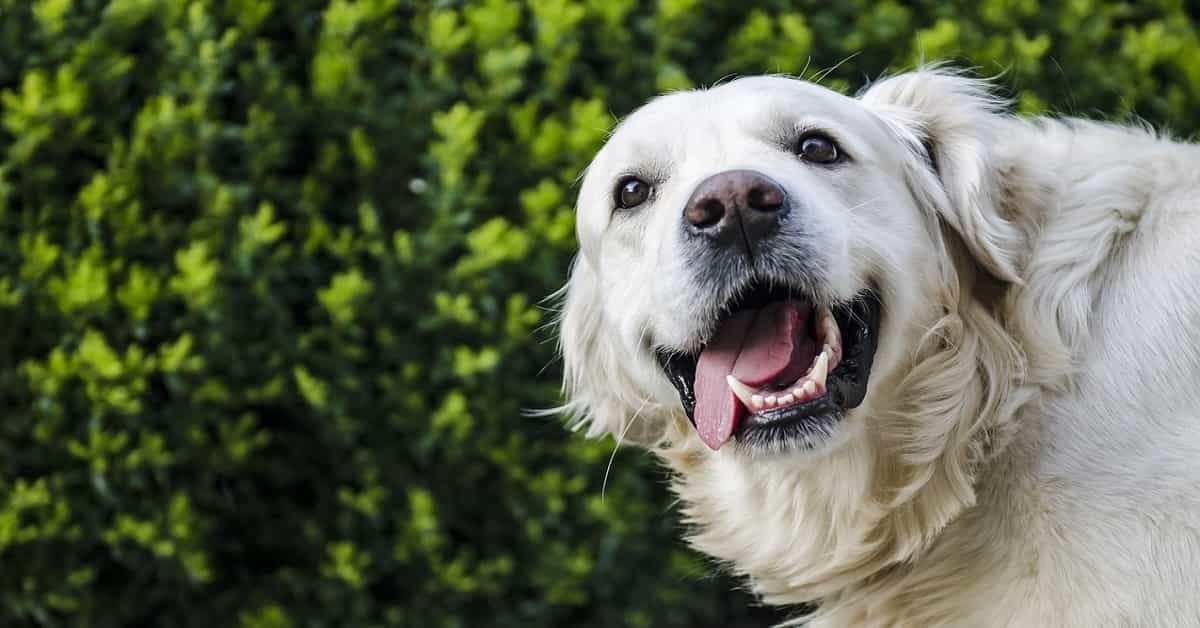It’s one of those wonders of being a dog. If they are not eating or drinking something with their tongue, they are tasting and investigating everything around them with their tongue not to mention their wet kisses to us.
Even more astonishing is the fact that most of the time the tongue is just sticking out of their mouth. Depending on the dog’s breed, the tongue looks long and heavy making you wonder, with the sharpness and bite speed that an average dog has,
“How do dogs not bite their tongue?”
Dogs don’t bite their tongues because mother nature has taken precautions that this should not happen. Their jaw nerves and tongue muscles have been structured such that they cannot close their jawbones without fully retracting their tongues.
This simply means that even though the tongue is located in the middle of the mouth surrounded by sharp dog teeth, the only way the teeth come together is when the tongue is fully inside the mouth.
Now even at that, there are moments where reflexes can take over. This overshadows the dog’s jaw’s natural tendency to close at the appropriate timing or cycle.
Some example of these moments are:
- When a dog experiences a seizure.
Dogs experiencing a seizure usually don’t have control over their bodily functions. They experience, twitching of their muscles, spasmodic movements which are not in their control, foaming in their mouth, and uncontrolled chewing motion.
The chewing motion is what can cause the dog to bite his tongue at that moment as it is not following the normal jaw movement cycle in a normal situation.
- When a dog is extremely excited.
Dogs that get excited a lot while playing are prone to bite their tongues accidentally. Games like Fetch, tugging or tug of war, etc can lead to a dog biting its tongue especially when the intended target is missed
You may also like WHY DOES MY DOG ITCH HIS EARS?
WHY DO DOGS HANG OUT THEIR TOUNGES
a.) They need their tongues hanging out to pant.
When dogs get hot they start panting, this is similar to the way we automatically start sweating when we get hot. You see in both narratives, the aim is to reduce the body heat of temperature by losing some liquid which in effect cools the body down.
For dogs, they can’t carry out this process through their skin as it is mostly covered with some form of coat, the way nature has designed them is such that the tongue has a direct link to their respiratory system, so what you have is whenever your dog pants, the cooling effect is sent straight to their respiratory system and from there to other parts of their body.
With this in mind, it is advisable to always have a bowl of clean fresh water available for your dog.
If you suspect your dog’s panting is abnormal, quickly try to contact your vet doctor for professional advice.
b.) The dog’s genetics
Some dogs just naturally have their tongue hanging out their mouth, you will see them with tongues that are just too large for their oral cavities. The Pekingese dog, St. Bernards, Pugs, Boxers, Pitbulls, Siberian Huskies, Rottweilers, Labrador Retrievers, Golden Retrievers, etc. fall into this category.
In this case, there is nothing wrong with these dogs, they will live a generally fulfilled, happy, and healthy life.
c.) Medical Issues.
Oral Health issues can lead to a dog that is not genetically disposed to hanging his tongue out doing it more often than normal. Rotten gums, broken tooth, fallen tooth, swollen gums, etc. All can lead to their tongue hanging out freely.
Also, some medication can lead a dog to hang out their tongues. It might be a reaction to the drug and usually comes with other symptoms. A trip to a vet clinic is advised here.
d.) They are in a very good mood.
Sometimes, your dog’s tongue hanging out does not mean something is wrong. It can be that your dog is having the time of her life and is in a very happy and relaxed mood.
Has she just gone for a walk with you? Has she eaten some delicious dog food? Has she been rewarded with her favorite treat? All this is enough to make your dog feel fulfilled and relaxed at the moment.
WAYS YOUR DOG MAY INJURE THEIR TONGUE.
Even though natural reflexes make it so that your dog cannot easily bite or injure its tongue. There are activities that your dog can engage in which can lead to wounding their tongue. It is important that we be observant and take necessary precautions to prevent this from occurring.
Some of the ways in which a dog can injure or wound their tongues are:
i.) Licking on rough and sharp objects.
Our dogs are limited to interacting with their environment through their sense of smell and taste. That means spikey or sharp surfaces that can’t be perceived through smell must be tasted to know what they are. This easily leads to scratches and cuts on their tongue.
ii.) Scotching substances.
That cocoa that spills on the floor or a hot plate of food that accidentally falls on the floor from the dining table is a big attraction and opportunity for your dog. A dog’s natural disposition is to taste the substance first and regret the action later.
So in this situation, the dog ends up scalding their tongue. The feeling of a scorched tongue is something that even we as humans can attest to, the discomfort and inability to enjoy other meals for some days, the loss of the sensation of thirst during that period. These are all things that our dogs feel too. Luckily the tongue usually heals itself in a couple of days and more importantly, the dog should have learned the lesson here.
iii.)Bites and Stings.
The fact that a dog’s tongue is always hanging out its mouth makes it easily accessible to flying insects, wasps, bees, horse flies, etc. All would see the dog’s tongue like a good landing spot even though the dog would annoyingly try to prevent this, snapping and trying to bite as a form of resistance.
A bee that finds its way to a dog’s tongue and experiences such resistance would definitely sting the tongue. We don’t need to expatiate on how painful a bee sting can be. Cases like this would always require the attention of a vet doctor.
iv.) Allergies.
As we mentioned earlier, dogs interact with their environment through tasting and smelling them mainly. Some of the things they taste can lead to some form of allergic reactions in them, swelling of the tongue, swelling of the gums, and other health problems are probable in this instance.
WHAT TO DO WHEN YOUR DOG INJURES ITS TONGUE.
- It is important to calm the dog down, a dog that is acting agitated or excited would only lead to an increase in the blood pressure, this means more blood flows faster to the wounded area and more bleeding, so calming your dog would reduce the blood pressure and make the bleeding stop in less time.
- Depending on your relationship with your dog, you can apply a little pressure to the wounded area. Although we would advise an alternative, present your dog with a bowl of ice water. Your dog lapping on the water would help numb the pain a bit while the bleeding recedes.
There would be a little blood in the bowl as the dog laps on it. Do not let this discourage you, remember you are treating a tongue injury. In the case where ice water is not available. Regular cool and freshwater can be used.
- The bleeding should usually stop within five to ten minutes. If it takes longer, you would need to call on your vet doctor or better still take your dog to the vet clinic for proper analysis and treatment.
IN CONCLUSION.
Dog don’t bite their tongues as mother nature has taken good precautions to prevent such an occurrence, however looking at the nature of a dog’s tongue and its use, getting them injured is not far from your dog. The best thing you can do is to have a good dog first aid pack in case of these types of emergencies. After all your dog expects you to be able to able to handle any situation around both of you, that’s why you are the alpha.

Hi, I am Charles Nwankwo Editor-in-Chief, Mydoggything.com. Gleaning from Professional Dog Trainers, behaviorist, Registered Veterinarians, and Breeders. We are passionate about making dog care easy for you. My job is to make sure that you get the best-updated dog care information to understand and take care of your dog or dogs.
